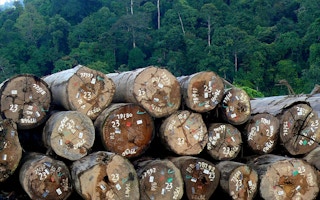There is no questioning the value that certification could bring to agroforestry, a sector lumbered with a range of issues from the abuse of indigenous people’s rights and deforestation, to biodiversity loss and greenhouse gas emissions.
But while setting standards is a sign of progress to some, certification schemes in the agroforestry industry do not always enjoy a good reputation for safeguarding the ecosystems they are supposedly designed to protect, particularly in Southeast Asia, a region that is home to some of the world’s richest ecosystems.
Professor Alain Rival, regional director of the French Agricultural Research Centre for International Development (CIRAD), tells Eco-Business that certification standards are “far from perfect and not sufficient to stop deforestation in the most ecologically critical areas such as Borneo.”
Ahead of this month’s Singapore Dialogue on Sustainable World Resources event, Eco-Business spoke to experts about the problems with agroforestry certification, and how to fix them.
“
There is still a large disconnect between calls for palm oil supplies to be certified and actual demand for such products, which slows down the pace of change.
Fawziah Selamat, deputy director, sustainability, Singapore Institute for International Affairs
A matter of governance
The world’s largest forest certification scheme, the Programme for the Endorsement of Forest Certification (PEFC), and the largest palm oil certification framework, devised by the Roundtable on Sustainable Palm Oil (RSPO), are both industry-led schemes. So what role do governments play in certifying sustainable practices?
Dr Reza Azmi, executive director of Wild Asia, a Kuala Lumpur-based social enterprise, says that certification schemes are an effective way to persuade large corporate growers to embrace sustainable practices. But the corporate sector can do little to change trends in land use, which are largely controlled by governments, he says.
“Certification standards have a role to play, but the direct involvement of governments is pivotal,” says Rival, calling on Indonesian regency authorities to step up their control of “hazardous practices” in agroforestry.
Rival suggests that certifications alone are not enough to end destructive practices such as slash-and-burn land clearing, a traditional method that uncertified farmers have used in Southeast Asia for generations.
Triple standards
Malaysia and Indonesia, the world’s two largest palm oil producers, both have domestic certification schemes; Malaysian Sustainable Palm Oil (MSPO) and Indonesian Sustainable Palm Oil (ISPO) standards. The Malaysian government intends to impose MSPO standards for all operators by 2019, while Indonesia intends to do the same with ISPO by 2020.
Mandatory certification shows that Malaysia and Indonesia are serious about facing up to the environmental problems of the palm oil sector, says Dato’ Dzulkifli Abdul Wahab, chairman of Felda Technoplant, a Malaysian government agency managing smallholder plantations.
Alluding to the decision taken by the European Union to ban palm oil for biodiesel over deforestation concerns, Dzulkifli tells Eco-Business: “These efforts should be supported by the international community, which should stop linking palm oil development to environmental degradation.” There are other sectors that cause greater environmental degradation which have escaped scrutiny, he argues.
However, as national certification standards become mandatory for all, companies that are already adopting international standards such as RSPO’s, which are voluntary, find themselves with an additional set of requirements to meet.
Multiple certification schemes can be confusing for consumers, markets and producers, says Azmi.
He adds that Wild Asia has not been able to convince the Malaysian authorities that RSPO certified growers should be exempted from an additional round of certification under MSPO, which are generally considered to be easier to meet than RSPO’s standards.
Certification—a cost without a reward?
Certification comes at a cost for producers, but not always with a reward.
Rival says that an unfortunate irony of certification is that it is advanced by markets in the developed world but its costs are borne by producers in developing countries.
“There is still a large disconnect between calls for palm oil supplies to be certified and actual demand for such products, which slows down the pace of change,” says Fawziah Selamat, deputy director of sustainability of the Singapore Institute for International Affairs. Buyers need to not only demand certified palm oil, but demonstrate that they are willing to pay for it.
Fawziah adds that in order to speed up the shift to sustainable palm oil and ensure certification is relevant for palm oil producers, the benefits of sustainability should be made clear besides appealing to companies’ sense of goodwill. This includes economic payoffs such as how certification can boost yields and provide a more stable supply chain.
“Showing that certified plantations are more efficient could prove to be a stronger rallying point for certification if current calls for environmental sustainability are not moving the needle,” says Fawziah.
The least wrong option?
While certification is not without challenges, what alternatives does the agroforestry industry have?
Azmi suggests that the ecosystem of players in the agroforestry sector should work closer together. For example, certification schemes can encourage large growers and smallholder farmers to work together, to “go to the heart of what responsible businesses should do”.
Rival proposes that certification standards should build on science-based evidence to better assess the environmental impacts of agroforestry, and decide on the standards necessary to preserve fragile natural habitats.
“Certification is right now the least wrong option. It can set norms and thresholds where they did not exist before,” adds Rival.
“Certification is undoubtedly a key step, but not the final destination,” he says.
Certification will be among the topics for discussion at the 5th Singapore Dialogue on Sustainable World Resources event, when delegates will debate how the agroforestry and resource sectors can adopt sustainable practices as they grow.
The 5th Singapore Dialogue on Sustainable World Resources, which is organised by the Singapore Institute of International Affairs, will be held at the Grand Hyatt Hotel on Friday 18 May.


















